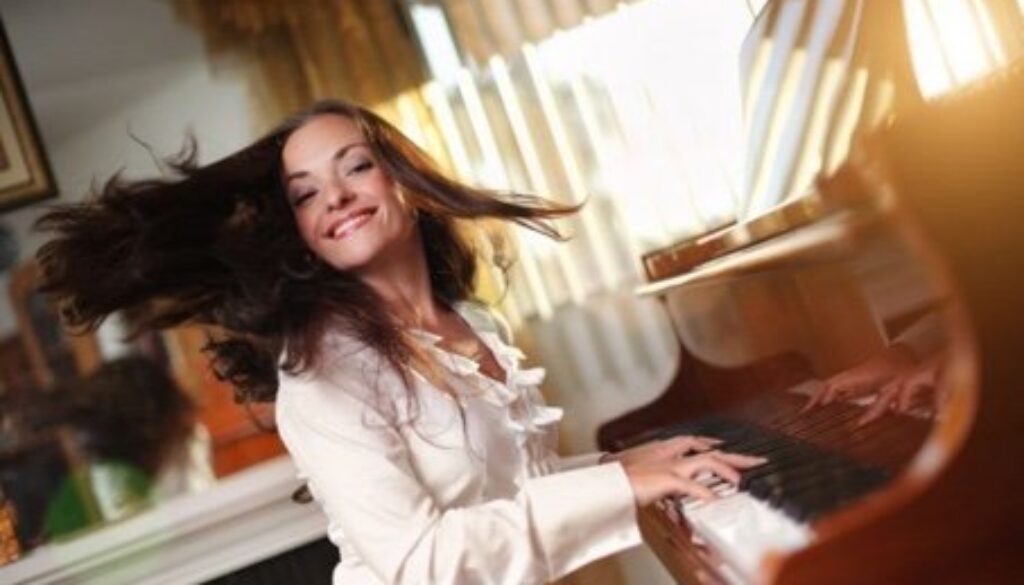What is the Best Piano For Beginners?
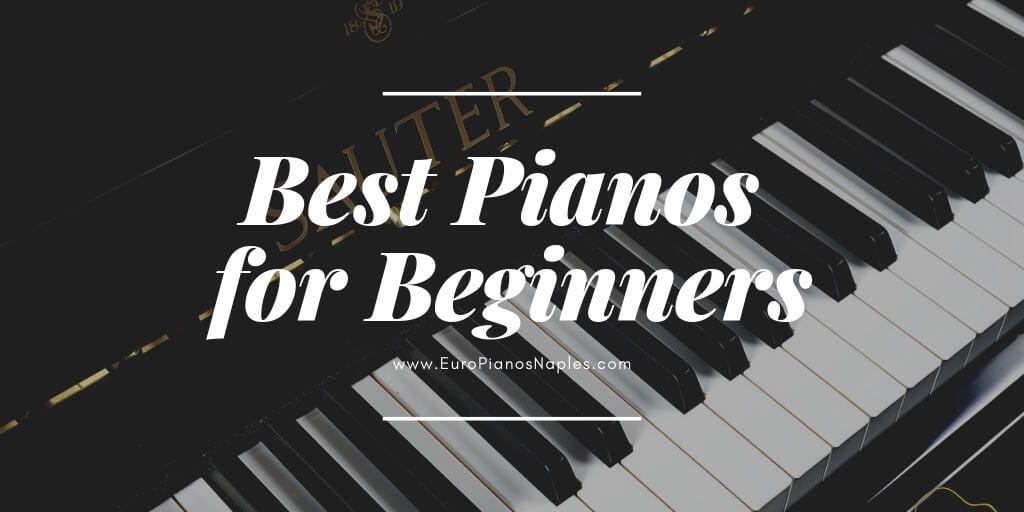
They say it’s never too late to learn. But for an adult who is interested in learning piano and doesn’t get a start as a child, it may look like a daunting challenge. Where to begin? There is much to know about pianos and music, and one might be correct to think it’s difficult. A lot of the difficulty depends on the intentions and desires of the beginner. Any endeavor that requires dedication and focus, such as making music, brings its own rewards. We believe the entire process involved is a noble and humbling effort. The more passion one has for the process, the more successful one will be.
Children who start piano lessons at a young age have an easier time of it because they have no preconceived ideas of it being difficult or complicated and the young brain of a child is much more adept at quick learning. Adults may have heard stories or read accounts of others’ learning curves and fear that learning to play the piano is beyond them. All of us have watched extraordinary professionals and thought, “Wow, I could never do that!” And it may be true that we can’t all master the piano like a concert pianist, but that’s not to say we can’t enjoy playing the piano and do it well. Myriad people, from ages five to eighty-five have learned piano and have reaped immeasurable pleasures from doing so.
7 Benefits of Playing Piano
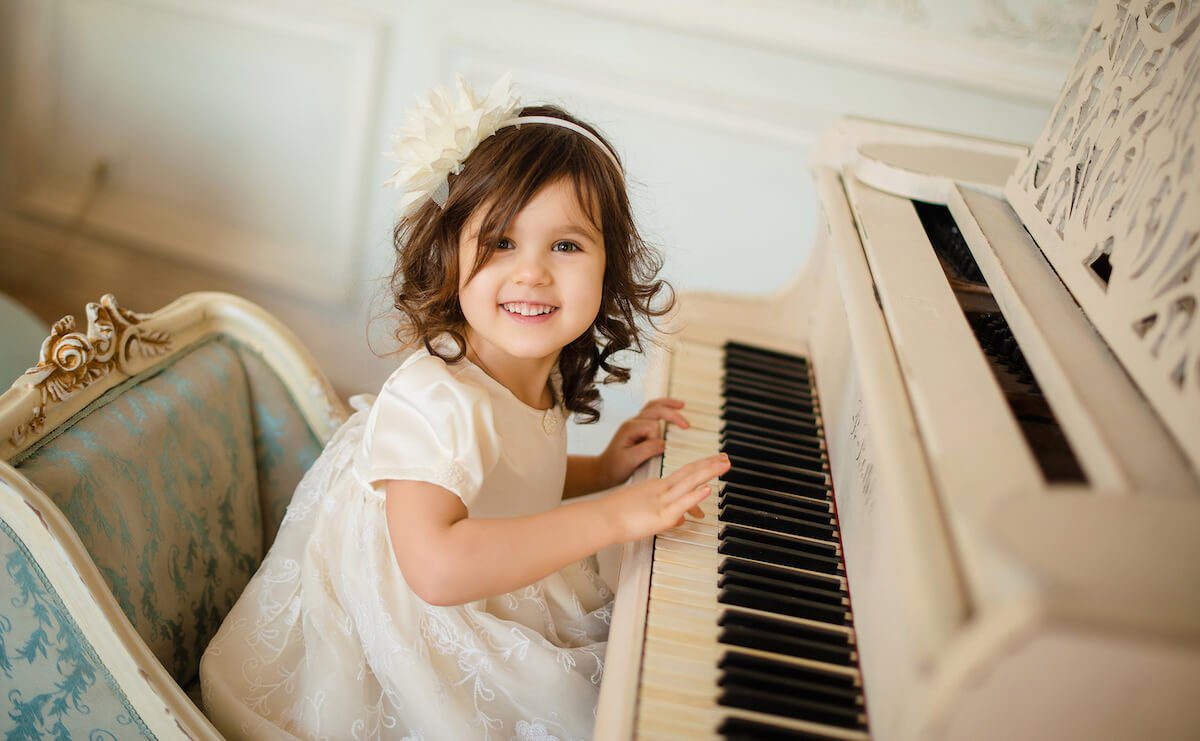
There is no other instrument that accomplishes the level of solo musicality that a piano does.
- The piano provides both melody and harmony, thus does not need any accompaniment. In fact, usually the piano is the accompaniment to other instruments. Most sonatas for cello, violin, clarinet etc. are written with the piano as the accompaniment.
- A piano makes a coherent tuneful sound right from the very beginning. Depress a key and you have a lovely note! Other instruments may take many months of study before a pleasant sound is produced (this is especially true of brass and string instruments as many a parent will attest!)
- Mastering the piano requires a unique co-ordination which together with regular practice cultivates cognitive skills. You really do have to multi-task which builds useful mental skills!
- Playing the piano often leads to performance opportunities whether for family and friends or at teacher recitals or even proper concerts. Learning to focus on sharing music rather than on our own fears and insecurities develops confidence and presentation skills necessary in life.
- People play piano to relax. Surprisingly many physicians, politicians, lawyers and actors play piano to decompress after a difficult day.
- For younger children – studying the piano aids in understanding math. Time signatures specify how many beats there are in bar. Notes each have a value (some are fractions). Learning to navigate a piece of music (often with the aid of a good teacher) is empowering and educational.
- Seniors who suffer from Alzheimers or Dementia often find it hard to communicate. Music can be a wonderful gateway. That is why pianists in a senior’s residence are so popular. The residents are engaged and joyful when the piano begins to play.
To elaborate on that a bit:
Playing piano can be many things to different people. It can fulfill a creative urge. It can enhance social life and entertain or comfort others. It can be a serious profession for teachers and those playing in piano bars, places of worship and in acclaimed concert halls. It can be a hobby, an obsession, a pastime, or a way of growing cognitively, physically and emotionally.
Yes, there have been studies that learning to make music changes the brain and in children actually boosts their academic performance. One who has studied this is Glenn Schellenberg, a psychologist at the University of Toronto who conducts research on the effect of music and musical instruction, as well as being a music conductor. He suggests that spending money and time on music lessons and practice is a solid investment in mental fitness.
For all of music’s beauty, power and capacity to move us, researchers have concluded that music is just a mood drug if it is consumed only passively. If you want music to sharpen your senses, boost your ability to focus and perhaps even improve your memory, the latest word from science is you’ll need to play an instrument yourself!
Schellenberg’s research also addresses how children who take music lessons differ from other children. Children not exposed to music lessons tend to have a lower IQ than children that are taking music lessons. The music lessons themselves then cause further improvements in IQ.
So, it’s not a far stretch to believe that anyone wishing to better themselves will benefit from music lessons, even adults who did not have an opportunity to take piano lessons as a child. The point is: It’s never too late to learn.
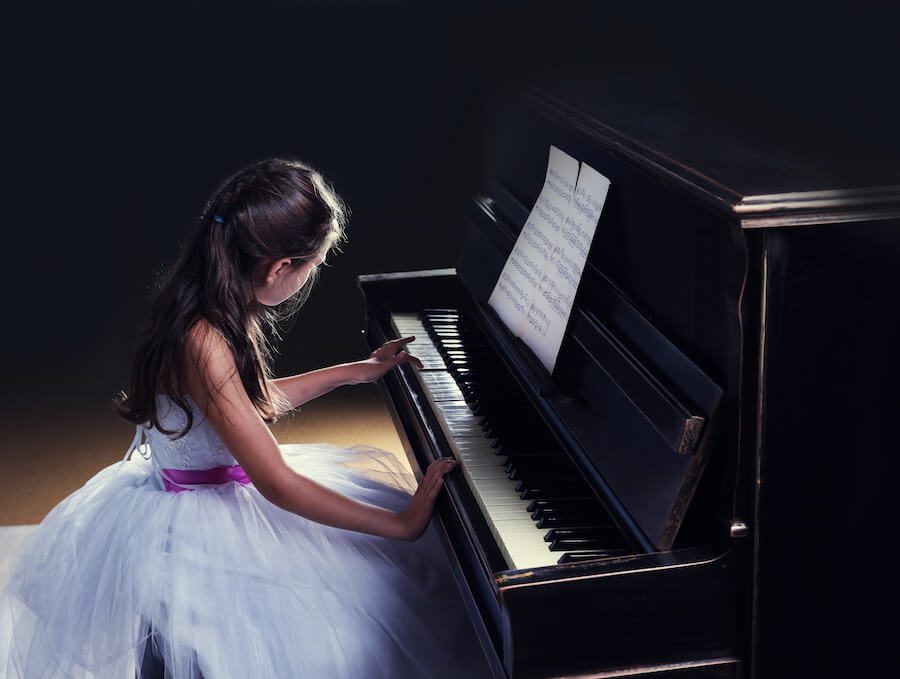
What Kind Of Piano Should A Beginner Buy?
The best piano for beginners is realistically the very best piano you can afford. Do not make learning the piano impossible or needlessly difficult by not providing a proper or even a good piano, something that lets the beginner understand how notes should sound during the learning process.
Many beginners feel they don’t deserve a good piano until their playing improves. How can it improve without a good piano? It’s a classic chicken and egg situation. Do not let that determine your choice – purchase the best piano you can comfortably afford and go forward from there. We have included studio, consoles and baby grands to accommodate everything from the affordable to the high-end best. MSRP prices are often discounted by dealers, and these are based on most simple (usually black) cases available. Other color and wood options and customizations can affect prices.
The Top 10 Best Pianos for Beginners
Here are the top ten pianos we recommend for beginners.
Pearl River EU122 MSRP $6,695
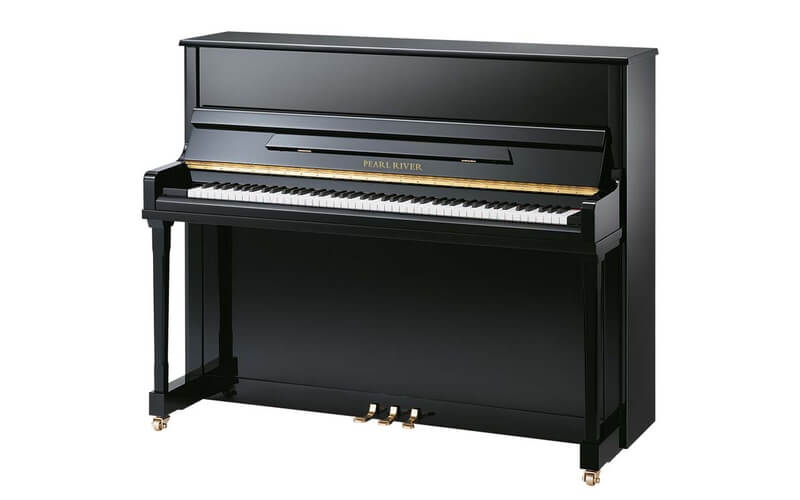
This award-winning piano is a 48” upright, suitable for all level of players. Made by the largest piano builder in the world, with over 4,000 employees and extraordinary quality control, the Pearl River pianos have been redesigned recently by Swiss expert, Lothar Thomma.
We especially like it because it has a feature normally found in much more expensive models. The treble section where the most tension exists, has been given greater strength by back posts which provide an even, pleasant tone across the piano. In addition the bridge is notched by hand, the felt used on the hammerheads is premium German, and the complex construction of the spruce keybed can withstand heavy use.
Hailun HU5-P MSRP $12.466
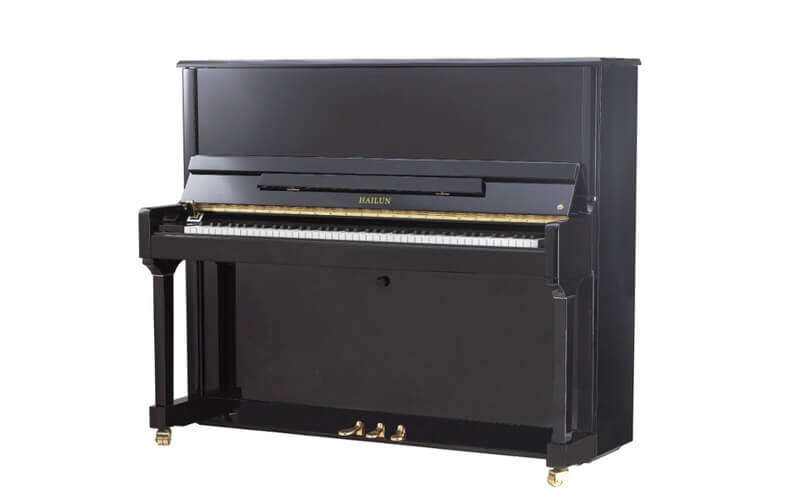
This 50” studio upright piano is powerful but well balanced. Larger than a standard 48”, it is not overpowering like some 52” instruments. Played quietly, the tone is felt-soft, but with more vigor, it quickly converts to a bolder sound, making it very responsive with a colorful tone. German Wurzen felt is the secret to good sound. With relaxed keys, touch is still firm.
The well-made Hailun parts give the added benefit of stability of action and tuning. It carries an exclusive PAS Keyboard Stability System. A laminated maple pin block, bass agraffes, and wet sand cast plate and all wood European action parts provide a lot of control for the pianist. A nice touch on this model is the slow-close fallboard and classic lines of the design.
Ritmüller UH-121RA MSRP $9,995

The 48” Ritmuller UH-121RA is one of the uprights that benefited from an affiliation with the Pearl River Group and re-engineering from Swiss expert Lothar Thomma. The range of upgrades added quality components including plate modification for new scales, new string lengths, and double wheel metal casters to name only a few.
Ritmuller which originated in Germany now under the parent Pearl River, competes in the Asian market, against Yamaha and Kawai. In the lower end models, they outperform them. In the higher end models, they are competitive at a much lower price, and challenges them in musicality and sustaining tone. Ritmuller UH121 was singled out by the definitive “Pianobuyer.com” as their favorite piano in this category.
Charles R. Walter 1520 MSRP $17,500 - $19,000 (dependent on cabinet)
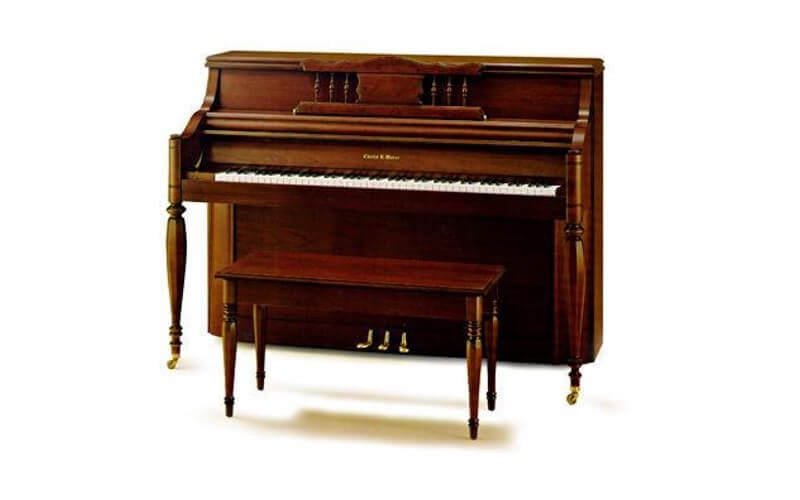
The Walter 1520 consoles are not called studio pianos but in fact carry the same size action as their professional studio pianos with the same long strings, and long keys. At under 43” it is a smaller piano but with the added inducement of beautifully styled furniture cases in many designs such as Queen Anne, French or Italian Provincial, Traditional, and more. Furniture cabinetry sometimes becomes a major factor in choosing an instrument that will reside in a living room or parlor of the home.
The 1520 has a pleasing tone, and excellent tuning stability with warranted reliable parts.
Sauter Pure MSRP $39,900
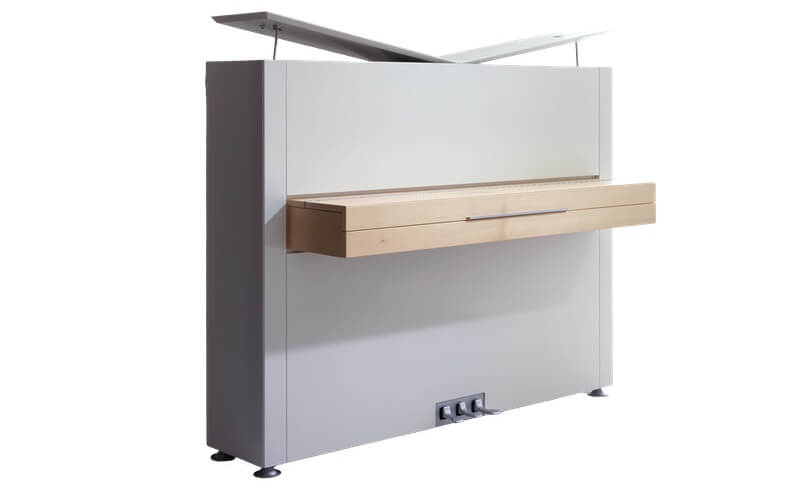
For the truly high-end upright that excels in performance as well as design, we must mention the Sauter Pure Basic 48” upright. Designed by Peter Maly, a famous German designer exclusively for the high-end Sauter piano brand, the Pure has the clean lines and Bauhaus simplicity to compliment any décor–an art piece in its own right. More importantly, the Sauter components within are representative of one of the finest German piano builders in history, founded in 1819.
Sauter pianos are especially known for their lush, full, singing tone, and for the variety of finishes and styles in which they are available.
Ritmüller GH-148R MSRP $16,495

This 4’10” baby grand is another product falling under the Pearl River umbrella that was re-engineered by Thomma, resulting in an instrument with warm-toned bass and middle sections, and slightly bright top end tones, and a nice even touch. It’s an ideal choice for a grand piano at a moderate price. It has the same action and sostenuto and feel comparable to the performance of a larger grand for a higher price.
Hailun HG178 MSRP $30,024
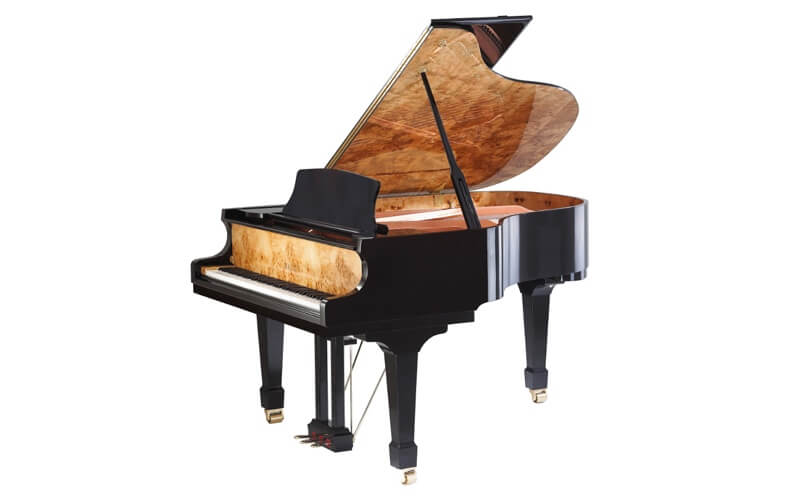
The 5 ft. 10 in. Hailun HG 178 grand is known for its dynamic action and rich tone. It has a cast iron plate and solid spruce board, and boasts a slow-close lid that has been nicknamed “the finger saver.” Hailun has spent years improving their products. By investing in computer-controlled machinery for precision keys, keybeds, and more, they have achieved an unusually high level of precision, with the pianos showing intelligent design and quality control.
The founder, Chen Hailun, in an entrepreneur in the Western style and is deeply involved in every aspect of the company, thus earning the respect of both American and European dealers.
Kawai GX-2BLAK MSRP $45,495
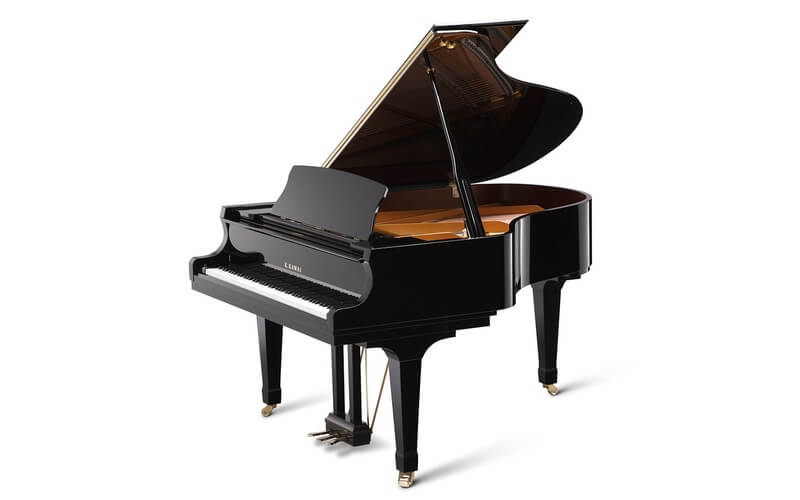
The GX-2BLAK grand piano from Kawai is 5’11” was the winner of the 2017 coveted “Product Excellence Award” from Music Inc. Magazine with its exquisite clarity of tone. This piano was upgraded from an RX model to replicate the sound quality of 6’ and 7’ grand pianos. Kawai features an advanced Millennium III Action providing a dynamic range between thundering fortissimos to delicate pianissimos. In addition, the keys of the GX-2BLAK are longer and their mahogany hammers are the preferred wood for a lighter, faster keystroke and release.
A more complex sound was achieved by laminating the bridge, so the vibrating string frequencies travel through various optimized hardwood layers of the bridge to the solid spruce soundboard. It has great sustain – the sound hanging in air after release – comparable to much more expensive instruments.
The Aire™ Piano MSRP $49,995
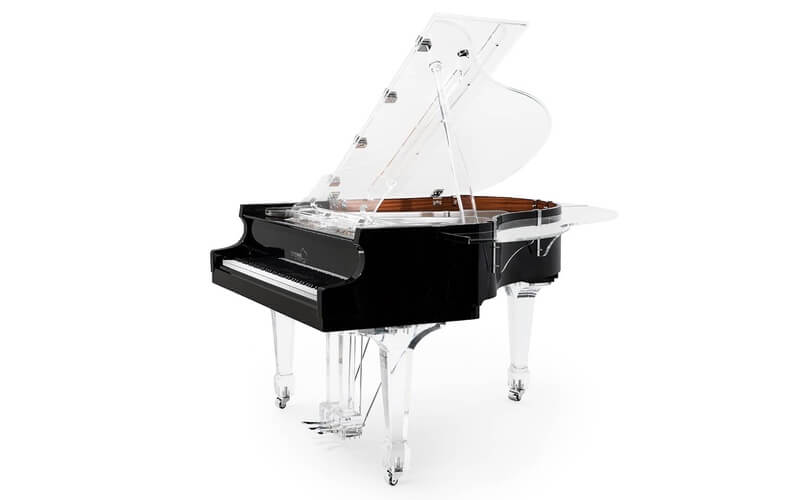
There’s nothing that says beginners might not prefer a highly- fashionable designer piano. The 5’3” Aire™ baby grand acrylic piano is just such an instrument, the only American made acrylic piano, and offered at an affordable price. A glossy wooden case creatively fused to acrylic legs, lid and lyre transforms a behemoth in the room into airy art that seems to levitate.
Manufactured in Miami, Florida by Euro Pianos Naples, the Aire™ is the hot new piano featured on the March 2019 cover of Architectural Digest. It has also been featured in the New York Times, Australian Vogue, and other major publications. Its high-quality non-yellowing acrylic and performance quality sound make it a favorite in modern homes as well as professional venues.
Fazioli F156 MSRP $120,000

In knowledgeable piano circles, when people discuss “the best piano,” there is one brand that will always come up. Fazioli, an Italian piano builder and a relative newcomer (since 1981) to the industry, simply makes magnificent instruments. When money is no object, and you want the best that money can buy, the 5’2’ Fazioli F156 baby grand is probably your best choice.
The smallest model of their collection, this baby grand has remarkably powerful and clear sound. Handmade by artisans, each component of the Fazioli is crafted with no detail ignored. Fazioli refuses any industrial approach to piano building, and pursues the objective of uncompromised quality. When you don’t know how to drive, but nothing will do but a Ferrari, the Fazioli is the piano choice for you.
Other Things To Consider
Learning to play piano is an exciting and beneficial addition to your life. It takes time and patience, commitment and enthusiasm to see it through, but anyone who’s done so can tell you what a wonderful adventure it is. So, if you have considered all that, here’s what’s left:
Budget
Nobody can truly judge what the best beginner piano is for you. Each situation is unique depending on the available time, goals, and passion of the person learning not to mention the finances. It’s obvious that most beginners are not going to go out and buy a high-end luxury piano before they even know how to play. But there are lower priced excellent instruments that can be used to assure performance value without having to mortgage the farm to pay for it.
We cannot stress enough that the quality of the instrument is directly related to the success of students, in studies done over the years. A good piano will produce good results, and a student needs encouragement. So, we reiterate, buy the best you can afford.
Piano location
Depending on how much space is available in your home, the type of piano you buy may be dictated by floor space. A small upright piano might be just the thing for your apartment or modest living room. People who have the luxury of a dedicated “music room” (or basement) or have large living quarters, tend to buy a baby grand. It pays to plan ahead and measure the available space before shopping for your instrument.
Difference Between A Piano And A Keyboard
Beginners sometimes think that they should start with a keyboard because it’s small, cheap and gives you the wiggle room to change your mind. (Hardly the commitment needed to learn piano). So, just what is a keyboard?
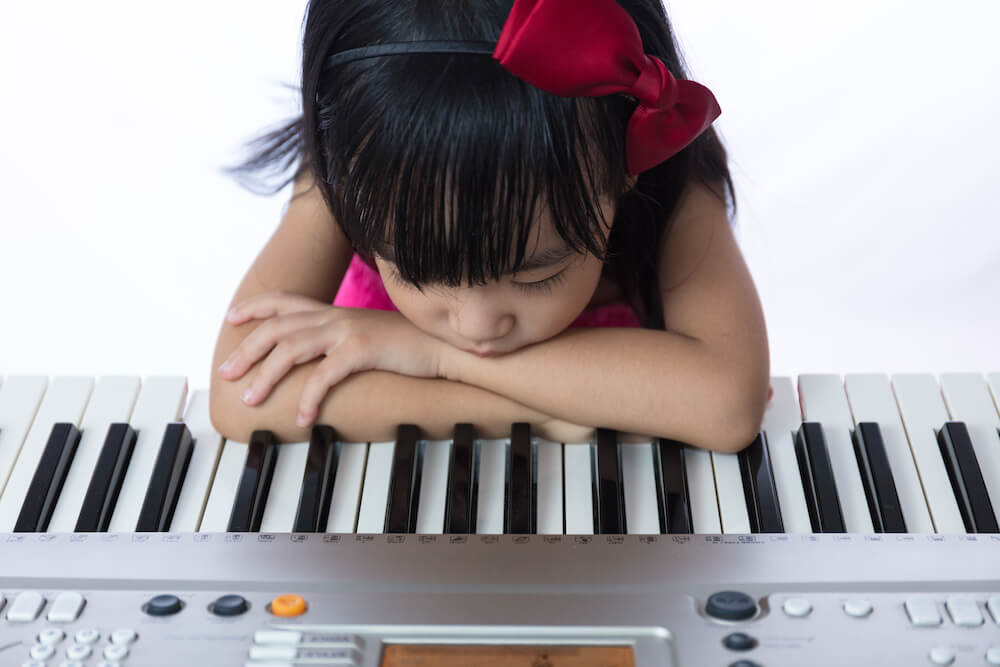
According to Wikipedia, a keyboard is basically a portable set of white and black piano-style keys which the player presses, thus connecting switches which trigger electronic circuits to generate sound. Most keyboards use a keyboard matrix circuit to reduce the amount of wiring necessary. Electronic keyboards often use unweighted keys to save costs and reduce the weight of the instrument.
In today’s market, advances have been made, placing the keyboards on stands with legs, and installing them in empty piano cases for stage events. Digital pianos evolved which typically have weighted or semi-weighted keys, trying to replicate the feel of an acoustic piano.
Electronic keyboards should have 88 keys in order to be full size. Anything less is confusing when you find yourself at a regular piano (which you undoubtedly will at some point). It is also important to have a “touch sensitive” keyboard – so that you can play a note loudly or softly which is necessary as you learn to play the “dynamics” in music. As you progress, an acoustic piano will be necessary.
A keyboard might be just the thing for someone who travels a lot and wants to practice when they are on the road, for example, or they may wish to practice at home with headphones so not to disturb others.
With that being said, the difference between keyboards and acoustical pianos is enormous. We strongly believe that the acoustic piano is superior to the digital, because it produces music created by the individual touch on keys hitting hammers on real strings. The vibrations of those strings create harmonic overtones that sound simultaneously, creating a beautifully full and rich sound.
Acoustic pianos offer a range and tone, and a keyboard-touch response that the best digital piano is hard put to match. All students should have the chance to practice, at the very least, on an acoustic model to understand the performance values between well-made and mass-produced pianos, much less electronic keyboards.
Self -Playing Piano Player Systems – Do You Need One?
Player piano systems have evolved from the old 1920’s punched paper rolls in Grandma’s upright to elaborate and sophisticated electronic devices that offer many options today. They are installed unseen in the piano, and can be operated with iPad, iPhone, iPod or other electronic devices. PianoDisc, one of the leading brands in the market, seamlessly integrates with your home audio or video systems, so you can watch performers in amazing high definition video format. Entire music repertoires are available in every genre, all your favorites at the touch of your finger.
There’s no doubt that listening to professionals can enhance the learning of the beginner, so one could say that having this system installed in your piano as a tool for nuance and method might very well work. It might not be a needed tool, but in addition to the exposure to piano music, the entertainment value for family and friends makes the device a great addition to the family piano. A trained player piano technician can install these easy to operate systems.
Finding A Teacher And Taking Lessons
There are many ways to learn piano. A competent piano teacher who comes to the house and spends an hour with you on the family upright is a model that still works. There are many excellent teachers available, as well as professional pianists who competently teach piano in their off time.
The costs for such private tutoring is usually commensurate with the abilities and reputation of the teacher. It helps to do your research, and ask around, “who do you know that gives piano lessons for beginners?” Colleges, universities, libraries, as well as any neighbors or friends who play are a good starting point. The internet will undoubtedly have a list of teachers in your location. Just ask for references and you should have no problem.

Through the magic of the internet, you can now buy beginner’s piano lessons online (Check Out Amazon’s Best Sellers), or even avail yourself of free lessons, but to seriously pursue beginner’s piano, we would encourage you to find a real, live teacher. There is no substitute for hands-on learning and discussion. Someone needs to hear your playing to correct your errors in real time, and to see you in order to correct a beginner’s piano hand position – a very important foundational aspect when learning piano.
Most pianists are nervous to play in front of others, so it helps to have someone to play for in person right from the get go. It is hard to learn physical activities from the page. Driving a car, playing golf or learning piano are activities that naturally call for tutorage. In order to develop good practice habits, it also helps to have assignments and goals set by a professional who knows the steps to learning properly and moving forward. Besides – it never hurts to have your teacher right there to praise your progress!
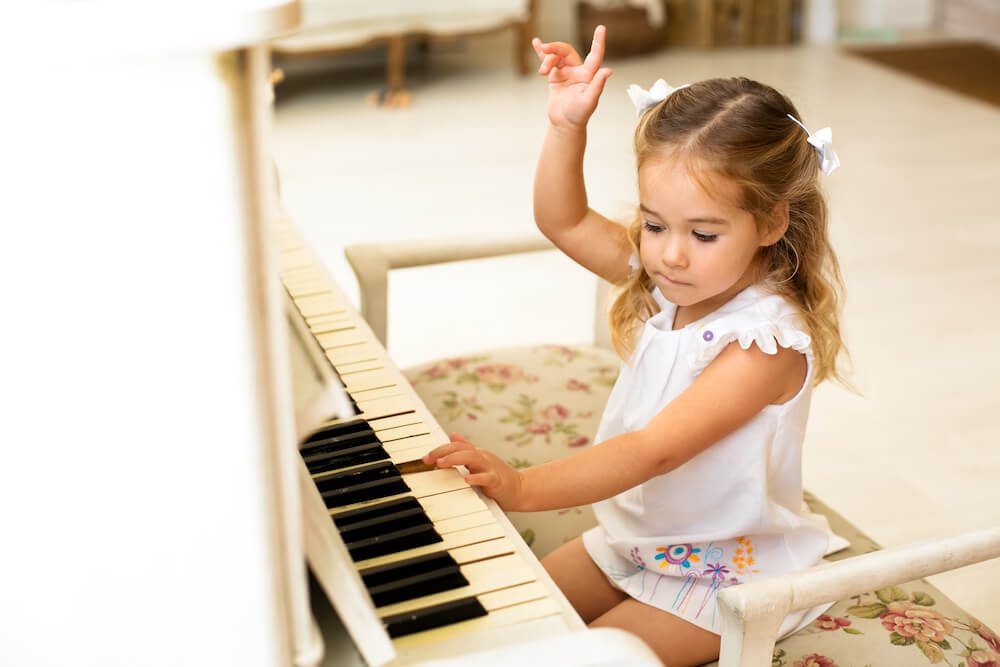
Having said that, there are many, many amateur pianists enjoying their music who have never had a formal lesson. Some people just have the ability and discipline to dig in and learn on their own. It might be more difficult, but that is the way they are wired and how they learn best. To this, we can only say the best of luck and may you succeed. Some people can play by ear. Trained people read from the sheet music. Your own individuality will dictate a lot of the learning process. Find a teacher that suits your personality, learning style and goals.
What needs to be learned, you might ask? There is much to learn, including: Sight reading, Notes, Intervals, Chords, Theory, Ear Training, Scales, Arpeggios, Rhythm, Articulation, Technique, Interpretive skills and Compositions. Does that sound like a lot? It’s not more than any person learns in doing something really well–including building a home, playing world class bridge, or competing in any sport. The details coming together is what makes the success so sweet.
Music is a world with its own language, and you will be learning to fit into that world. With practice, you can graduate from Chopsticks to Chopin if you have determination and focus. You may want to compose music or play lullabies for your baby. You may wish to jam with your friends Friday nights or lead your church Worship Team on Sundays. Every person has their own goals, their own dream. The main thing to remember is that it’s a journey, a process. So. make sure you enjoy it. If you are always expecting quick, perfect results, you will rob yourself of the joys of learning piano.
About Euro Pianos Naples
Euro Pianos Naples is a respected distributor of European luxury musical instruments. The company’s origin dates back to 1965. Euro Pianos represents world renowned brands such as Sauter, and it has recently become a manufacturer of its own acrylic instrument – The Aire. Apart from being a successful retailer, consultant, and entrepreneur organization, Euro Pianos is actively engaged in the artistic and community life of Naples, Florida as an organizer and supporter of musical events throughout the years.

